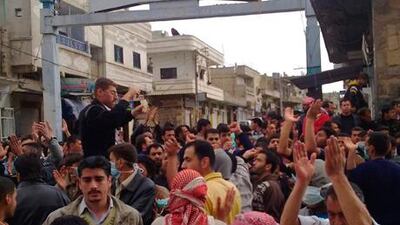DAMASCUS // After days of anti-government protests, there was a deadly escalation of violence in Deraa yesterday, with wildly different claims on how many died.
Details as to exactly what happened remained unclear, with two sharply contrasting accounts, one from the demonstrators, the other from Syrian officials.
Police fatally shot at least 15 people in an operation that lasted nearly 24 hours, witnesses said, with at least six civilians killed in a pre-dawn attack on the al Omari mosque. A civil rights activist in contact with people in Deraa told the Associated Press that police shot another three protesters in the city centre after dusk. Six more bodies were found later in the day, the activist said.
Hundreds of protesters were camped at the mosque site, vowing to remain until their demands had been met. They said electricity and mobile phone services were cut shortly before security forces attacked the compound, 100km south of Damascus.
One of those confirmed as killed, Ali Ghassab al Mahamid, was a doctor who was trying to reach the mosque when he was shot.
The Syrian government dismissed those claims, saying the allegations of a massacre had been fabricated in "foreign circles". Instead, the government said an armed gang, which had been operating out of the mosque, attacked an ambulance killing three people and, later, a member of the security services. The death of Dr al Mahamid is the only fact that both the government and protesters agree on.
State television yesterday showed footage of an extensive weapons cache that the authorities said had been found inside the mosque, with assault rifles, pistols, hand grenades, bullets and bundles of cash.
Quoting an unnamed government source, Sana the official Syrian news agency said the gangs in Deraa had used kidnapped children as shields. It reported that members of the gang had been caught by security and that, with the help of local people, the authorities continued to hunt down militants.
Yesterday afternoon there were renewed clashes between security units and protesters, including villagers from outside of the city who tried to march to the aid of demonstrators. They again accused authorities of using live ammunition and tear gas to suppress public dissent.
The city last night remained sealed off by security forces manning checkpoints. Independent media have had only limited access to the city, and have been unable to visit the mosque to verify claims made by either side. Some journalists for international news agencies reported having camera equipment confiscated.
Phone lines from the city have been disrupted. Apart from footage provided by state-endorsed media, the only visual accounts of events in Deraa are recordings made by residents on mobile phones and posted on YouTube. One of those recordings, which purported to be of yesterday morning's attack, showed the street in front of the mosque, with the sound of gunfire in the background and someone inside the mosque shouting "don't shoot".
One civil rights activist said: "We're all in a state of shock. We don't really know exactly what is going on, there is just not much information coming out that we can check and confirm. All we know is that what's happening is not good, people are afraid, the tension has spread now."
France yesterday urged Syria to stop using excessive force and called on Syrian president, Bashar al Assad, to begin genuine reforms.
"Political reforms must be undertaken without hesitation to answer the aspirations expressed by the Syrian people," foreign ministry spokesman Bernard Valero said.
Yesterday's shootings bring the number of civilians killed in Deraa since the outbreak of protests on Friday to as many 22, with unknown numbers wounded. In addition, scores of people have been arrested, civil rights activists say.
Just before the latest shootings, it had appeared that the situation in Deraa, which lies on the Syrian/Jordanian border, was beginning to calm. Government officials had been issuing conciliatory statements, saying that use of live ammunition by security forces against civilians had been prohibited, even in self-defence.
Even as the latest violence was taking place, a ministry of interior inquiry team was investigating the deaths of four protesters who were shot on Friday. The government promised a probe into those killings, and justice for those responsible.
Other concessions had also been made to meet protesters' demands, including the release of 15 schoolchildren, arrested for writing anti-regime slogans on a wall earlier this month.
It was announced last night that the governor of Deraa, has been sacked - another of the protesters’ original demands - and there have been various indications that senior local security figures have been removed from their posts, although without firm confirmations that such action hadtaken place.
Yesterday's violence has only added to the shock felt by Syrians, who went to bed expecting conciliation but woke to hear news of the bloodshed.
Until this month, Syria had not seen the kind of revolutionary protests which have swept the Middle East. The minor outbreaks of dissent snowballed dramatically on Friday with mass demonstrations in Deraa, which were fuelled in large part by local grievances. Security forces responded by shooting four civilians dead.
Among the demonstrators' demands have been for the release of all political prisoners and for an end to repressive emergency laws, which have been in place since 1963.
Authorities justify them as necessary given Syria's ongoing war with Israel. Critics say martial rule is used by the autocratic regime to quash dissent.
* With additional reporting by the Associated Press

